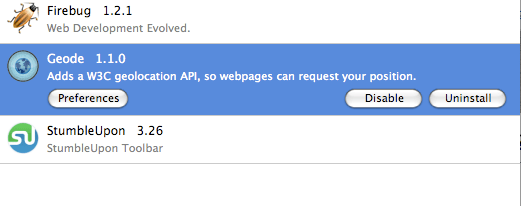
The plug-in will work with the Firefox browser. I’ve seen it in action and it works well. It’s not entirely clear how it’s pulling in the location data, but I assume it’s using either something similar to the Wi-Fi triangulation that the original iPhone used (before it had a GPS chip) or your computer’s Internet Protocol (IP) information.
[aditude-amp id="flyingcarpet" targeting='{"env":"staging","page_type":"article","post_id":98732,"post_type":"story","post_chan":"none","tags":null,"ai":false,"category":"none","all_categories":"social,","session":"D"}']If it’s not immediately obvious why you’d need location to be a part of the desktop experience since you’d be in a static place, remember that it would also work with a web browser on a laptop — and that people still use others’ computer in Internet cafes and on vacation. Location services will continue to become a bigger part of mobile applications, and if they’re going to sync seamlessly with their web-based counterparts, you’re going to want location data on both (if you want it at all).
I’m thinking of something like a social network such as Facebook or MySpace, where you’d use it on both your mobile device and your computer.
AI Weekly
The must-read newsletter for AI and Big Data industry written by Khari Johnson, Kyle Wiggers, and Seth Colaner.
Included with VentureBeat Insider and VentureBeat VIP memberships.
Another product Geode certainly makes sense for is Yahoo’s Fire Eagle, its developer platform for location. Sites Dopplr, Dipity, Pownce and Brightkite all have signed up to use Fire Eagle to pipe location information into their apps. Right now, that location still needs to be put in manually in the web browser, but that should change with the Geode plug-in. You’ll be able to pinpoint your exact location, neighborhood, city or turn it off. If you check the box labeled “Always do this without asking,” it’ll automatically pull whatever data you specified.
One potential hang up in Fire Eagle simply integrating Geode itself is that Yahoo has some sort of beef with the W3C, we’ve heard. The W3C is the consortium that develops interoperable technologies for the web. Geode is built off of the W3C’s Geolocation API Specification.
Update: Mozilla has a blog post about Geode today.
Geode works by using Skyhook’s Loki technology to find your location via Wi-Fi triangulation and IP information, as I expected. It claims to have an accuracy of between 10 and 20 meters, and will find your location normally within a second.
You can download Geode here. Right now it’ll work with services such as Pownce thanks to its Fire Eagle integration.
[aditude-amp id="medium1" targeting='{"env":"staging","page_type":"article","post_id":98732,"post_type":"story","post_chan":"none","tags":null,"ai":false,"category":"none","all_categories":"social,","session":"D"}']
Mozilla says that Geolocation features will be included in future versions of the Firefox web browser itself instead of requiring a separate add-on. Location just took a step closer towards web reality.
VentureBeat's mission is to be a digital town square for technical decision-makers to gain knowledge about transformative enterprise technology and transact. Learn More
